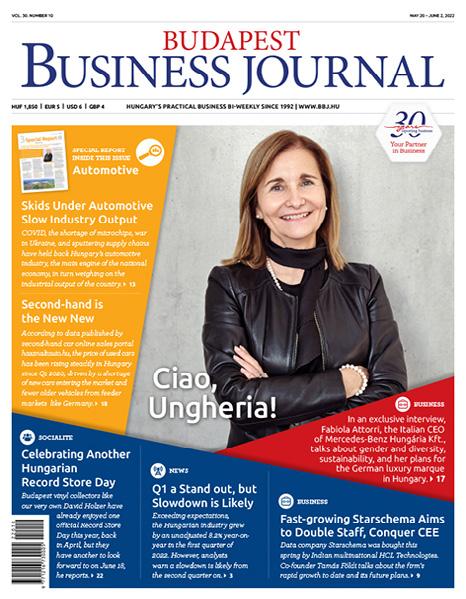
HUF 6,990 • EUR 18 The Most Influential Expat CEOs in the Hungarian Economy 2023
Expat CEOs
TOP
Top Expat CEOs in Hungary 2023 is a special publication of the Budapest Business Journal
• EDITOR-IN-CHIEF: Robin Marshall
• CONTRIBUTORS: Annamária Bálint, Györgyi Keszthelyi, Csilla Lengyel, Robin Marshall, Bernadette Oláh, Bálint Szőnyi, Erika Törsök
• LISTS: BBJ Research (research@bbj.hu)
• NEWS AND PRESS RELEASES: Should be submitted in English to news@bbj.hu
Zsolt Pataki • PUBLISHER: Tamás Botka, Business Publishing Services Kft.
• LAYOUT:
• ADVERTISING: AMS Services Kft. • CEO: Balázs Román
• SALES: sales@bbj.hu
• CIRCULATION AND SUBSCRIPTIONS: circulation@bbj.hu
• Telephone +36 (1) 398-0344, Fax +36 (1) 398-0345, www.budapestbusinessjournal.com

• ISSN 2631-0937
• Address: Madách Trade Center, 1075 Budapest, Madách Imre út 13-14.
3 Foreword 4 Uniting Science, Technology, and Talent to get Ahead of Diseases 6 Hungarian CEOs: The Energy Crisis is the top Threat to Economic Growth 8 HIPA Hopes for Best Year Yet in 2023, Beating Record-breaking 2022 16 HonestFood: A 3rd Way for Putting Food on the Tables 22 TOP EXPAT CEO BIOGRAPHIES 25 Masato Atsumi 26 Fabiola Attorri 28 Martin Baláž 30 Raffaella Claudia Bondi 32 Patrick Bontenakels 34 Nicolas Clavreul 36 Prabal Datta 38 Chris Dinsdale 40 Alfons Dintner 42 Dennis A. Diokno 44 Marc de Bastos Eckstein 46 Peter Gažík 48 Martino Grazzi 50 Isabel Marieluise Gruber 52 Umut Güney 54 Frank Iepema 56 Hans-Peter Kemser 58 Byung Kim 60 Arne Klehn 62 Pavel Kudriavtcev 64 Alex Laffan 66 Alberto Di Leo 68 Gabriel Makki 70 Hubert Mühringer 72 Florian Jens Naegele 74 Giacomo Pedranzini 76 Huw W. Roberts 78 Veronika Spanarova 80 Andreas Szakácsi 82 Thoralf Wagner 84 Guntram Würzberg 86 Dorota Zabłocka 88 Matt Zeller 90 Dr. Arne Ziegenbein 92 Nikos Zois 94 Barbara Zollmann 96 Content Photo by Forance / Shutterstock.com
Foreword
This is now the fifth occasion on which we have curated this publication honoring some of the leading foreign business leaders plying their trade in Hungary. The first few issues of Top Expat CEOs were in what we used to call “normal” times. That is not to say that the CEO’s lot was easy in 2018, 2019, or 2020, just that it wasn’t as off-the-wall crazy as in the last few years.
After all, no business boss has had to finesse economic activity during a pandemic since the three waves of the Spanish Flu from 1918-19. Nor has the C-suite had to factor in European war on the scale of Russia’s invasion of Ukraine since the first VE Day (Victory in Europe) of May 8, 1945. It is true that inflation is a more familiar, if no less welcome, foe. But even that feels somewhat different in the 2020s since it forms part of a three-for-the-price-of-one deal alongside supply chain issues and the energy crisis. Maybe that’s what they meant when they talked about the Roaring ’20s; the noise and clamor of executives responding to yet another set of simultaneous challenges.
The watchwords for this period seem to be agility and resilience. Time and again, you hear one or other, and frequently both, mentioned. The other day, I was moderating a roundtable discussion on logistics for the CEO Breakfast Briefing series we run with our friends at the GermanHungarian Chamber of Commerce and Industry, and there it was again. Businesses used to have years, if not decades, to respond to changes in the marketplace. Even then,
the leadership could get it terribly wrong: Exhibit A, the giant that was once the Eastman Kodak Company. That kind of timeframe is not a luxury afforded to today’s business leaders. Most analysts predict that we will return to single-digit inflation by the end of this year. The early signs are that we have crested the peak: Consumer prices were 25.4% higher on average in February 2023 than in the same month in 2022, but that was down from 25.7% in January, according to the latest data from the Central Statistical Office at the time of writing. Even so, in the 12 months since February 2022, food has seen a price rise of 43.3%, while electricity, gas, and other fuels became 49% more expensive. Consumers paid 12.6% more for consumer durables, and service charges increased by 11.6%.
If inflation stands at 9.9% in December 2023, the position will be measurably better than it is today. But those will still be far from ideal trading conditions. It looks like businesses will continue to need to display resilience and agility for some time to come, which will require clear-headed navigation skills from our captains of industry. Hungary has many skillful native pilots, but it is also blessed to have a cohort of exceptional expat leaders. We are delighted to honor some of the very best of these again here this year.
Robin Marshall Editor-in-chief Budapest Business Journal

4 TOP EXPAT CEOS
Hungarian CEOs: The Energy Crisis is the top Threat to Economic Growth

8 TOP EXPAT CEOS
By BBJ Staff
Some 85% of Hungarian business leaders predict the local economy will decline in 2023, while 76% think there will be a global slowdown.
According to PwC’s 12th annual Hungarian CEO Survey, officially launched on February 8, Magyar CEOs rank the energy crisis as the top threat to economic
growth, followed by inflation and macroeconomic volatility.
Bosses’ predictions for 2023 include annual inflation at 15% and an exchange rate of 421 forints to the euro. Despite the headwinds, however, Hungarian CEOs are not planning to lay off staff or cut pay; instead, they see cutting operating costs and raising prices as possible solutions.
The PwC Hungary survey was conducted with the participation of 267 local CEOs between October and December 2022 in parallel with the international study. The expectations for a decline in the rate of global (76%) and Hungarian (85%) economic growth in 2023 is the gloomiest yet seen in the survey’s 12-year history.
PwC says the predictions of economic decline are not surprising

9
HIPA Hopes for Best Year Yet in 2023, Beating Record-breaking 2022
István Joó, CEO of the award-winning Hungarian Investment Promotion Agency sat down with the Budapest Business Journal to discuss the details of another record-breaking year in 2022, the critical industries and countries for FDI, the strength of Hungarian investments, and the prospects for 2023, which he believes could see the bar raised yet again.

16 TOP EXPAT CEOS
Photo by Blue Planet Studio / Shutterstock.com
By BBJ Staff
BBJ: In most years, HIPA either breaks its record for investments in terms of value or is very close to it. What was the story in 2022?
István Joó: It was a successful year for HIPA because we reached new records in 2022. The investment volume amounted to EUR 6.5 billion, a new all-time high in the history of Hungarian investment promotion. And with those investments, the companies committed themselves to creating 15,000 new jobs on top of retaining 42,000. As a reminder, in 2021, the investment value was EUR 5.3 bln. So we are talking about a year-on-year increase of some 23%. We were able to close 92 deals in 2022.

BBJ: Are those 92 projects both investment and reinvestment?
IJ: It was both, and HIPA contributed mainly with non-refundable cash. We have a wide range of services we can offer to companies; identifying the necessary land, potential sites for the investment, and handling all kinds of company issues: HR-related, taxation, cooperation with universities and higher education. We have a bunch of services that we can offer to companies.
BBJ: Which countries were the leading foreign investors?
IJ: First of all, I’d like to mention the success of the “Opening to the East” strategy of the government, which was launched back in 2012. In 2022, 48% of our investments came
Our largest investor, based on volume, was South Korea. Germany was the second, and Hungary third. And this was followed by Switzerland, France and Japan. I’d also like to mention China here because it is a vital partner for Hungary. Last year, we announced the most significant greenfield investment in Hungary’s economic history, CATL’s more than EUR 7.3 bln investment in Debrecen. But, since physical works are just about to start in the first or second quarter, this number will be reflected in the 2023 data.
17
István Joó, CEO of HIPA
HonestFood: A 3rd Way for Putting Food on the Tables
By BBJ Staff
BBJ: In your CEO biography (see page 76), you stated your passionate belief in HonestFood. What is this concept?
Giacomo Pedranzini: HonestFood aims to change the food supply chain. Today there are two principal systems for getting agricultural products from producers to consumers. One is semiindustrialized conventional agriculture, and the other is organic farming. In my view, neither of the existing models can meet the food needs of a growing world population in a sustainable, long-term way. Neither guarantees a fair return and economic viability for all actors in the supply chain. Over the past decades, the price has become the sole cornerstone of market competition strategy. Therefore, we all, collectively, pay too high a price for cheap food.
I am convinced that the time has come to find a new way forward: we must find a good middle ground between industrial and organic farming and return to common sense. It’s time to change our mindset and put “quality at a fair
price” at the heart of our business policy instead of “high volume at a low price.” How can we supply our consumers with food of sufficient quality and quantity without exploiting animals, destroying the environment, and flooding the shops with cheap but low nutritional value products? The HonestFood concept must take over from industrial agriculture the mission to guarantee a stable food supply for all humanity while ensuring a fair income for all supply chain actors. But we need to incorporate the commitment of organic farms to nature into our concept, with a particular emphasis on protecting the health of people, animals, and our planet.
BBJ: How did you arrive at these conclusions?
GP: In 2012-13, Hungary’s meat industry was in crisis. I kept thinking: what are we doing wrong? How can farmers and food producers struggle to survive in a country like Hungary, a paradise for agriculture? The bankruptcy of several competitors, who had always pushed down prices, made me realize: we collectively pay a high price for cheap
food. It made me understand that the existing two models are inadequate to supply the planet’s growing nutritional needs. If we want a sustainable supply chain, we need to change.
BBJ: What do you mean when you talk about a sustainable supply chain?
GP: The production chain’s most sacred priority should always be human health. We must make healthy products and in such a way that their production does not pose risks to human health. After all, our diet critically impacts our health and life expectancy. We should also apply production techniques and technologies that do not endanger the ecosystem, do treat animals with respect, and guarantee that our natural resources can regenerate.
But there is another aspect of sustainability of the food supply chain that is barely discussed: economic and financial sustainability. We are talking about a sector with high exposure to vis major circumstances, such as weather, where prices are often highly volatile; thus, profit is not balanced. Sometimes a year of plenty is followed by two years of famine and vice versa. It is also a sector where, because of the low and uncertain profitability, it has been becoming increasingly difficult to attract young farmers; therefore, the aging of active farmers is a serious problem in the long run.
Volatility is not only harmful to the farmers. In the end, the consumer is paying the price. Too high prices deprive the poorest and most vulnerable strata of the population of food. Therefore, guaranteeing fair prices, partially by limiting volatility, is in the common interest of consumers and producers.
The distribution of profit is unequal in the supply chain. And the actors who are the weakest links, the farmers, breeders and craftspeople, are the most vulnerable. There was a famous case in Italy, which discovered that the income farmers gain from tomato sauce, sold at a shelf price of around EUR 1, was only about eight cents! Several good initiatives restrict unfair
22 TOP EXPAT CEOS
| PRESENTED CONTENT
The Budapest Business Journal talks with Giacomo Pedranzini, winner of the 2022 Expat CEO of the Year award and CEO of Kométa 99 Zrt., about his concept of “HonestFood.”
TOP EXPAT CEO BIOGRAPHIES
 Photo by Gorodenkoff / Shutterstock.com
Photo by Gorodenkoff / Shutterstock.com
Become a Boardroom Supporter to Reserve Your Seat at our CEO Boardroom Meetings in 2023
When we launched the Boardroom series in 2021, the idea was to provide an exclusive meeting point where critical stakeholders and partners from the business and diplomatic community could meet in luxurious but relaxed surroundings and exchange news and views. We wanted to provide those stakeholders and partners something different and genuinely value-added. Each event features a roundtable discussion of the current economic situation with expert analysis. The feedback from our meetings suggests our business and diplomatic network find these briefings highly valuable.
WHY SUPPORT THE BUDAPEST BUSINESS JOURNAL?
In 2021, we conducted a public experiment and launched a relatively new concept for newspapers in Hungary, connecting a direct link between readers and partners on one side and our journalism on the other. We are delighted to say that the idea was well-received by the market, which proved so open that it exceeded our expectations. Little wonder, then, that we have continued it since. If you are not yet familiar with the concept, here is why you might want to Support the Budapest Business Journal
COMMUNITY BUILDING
We neither aspire nor pretend to be a rival or an alternative to the chambers of commerce but instead work with them to build the expat CEO community. Whether through the Top Expat CEO award, the annual gala, the Top Expat CEO publication, or events like this Boardroom Meeting, we like to think we add some of the glue that helps bind the community together.

VALUE CREATION
This year we celebrate the 30th anniversary of our launch, a three-decade history of supporting the development of diversity and sustainability in Hungary’s economy. No other English-language newspaper has been in continuous print for so long in Hungary.
CRISIS MANAGEMENT
In 2020, we found ourselves living through a once-in-acentury pandemic. Since then, we have seen war return to the European mainland, prompting an energy crisis even as we face an existential threat through climate change. We operate in a period where disruptive technologies offer threats and opportunities, often simultaneously. Now, more than ever, factual business reporting is vital to good decision-making.
INDEPENDENCE
The BBJ ’s journalism is dedicated to reporting facts, not politics, and is not reliant on advertising from the government of the day, whoever that might be. The brutal truth is that media cannot survive without support. But outlets like the BBJ also offer opportunities that add value to businesses and communities. There are many methods of support, whether attending our events, subscribing to one or more of our services, recommending us to friends and colleagues, advertising in one of our publications, or supporting us in some other way. Like many other publications worldwide, we have also developed a method for people to support our work directly. We have three levels of Cub, Circulation, and Boardroom Supporters, with a rising level of benefits. To learn more about the program, please scan the QR code. However you chose to support the Budapest Business Journal, we thank you.



www.budapestbusinessjournal.com Budapest Business Journal, Your Partner in Business and a Reliable Source in Your Daily Decision-making Our Digital Services Available to Support Your Business For more Information Visit our Website.








 Photo by Gorodenkoff / Shutterstock.com
Photo by Gorodenkoff / Shutterstock.com




